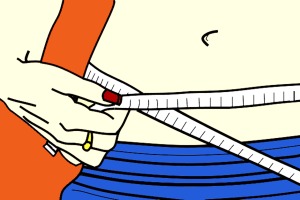Malnutrition can be a common complication with COPD. This is due to dyspnea, a major symptom of COPD, which makes people feel like they have no appetite. People with COPD require 10 times as many calories as healthy people in order to breathe. A patient may suffer dyspnea, have no appetite and not eat enough. They then cannot get enough energy from their food intake to breathe sufficiently and they can then feel tired and their dyspnea increases, making it a vicious circle. The best way for someone to supplement calories without having to eat more to do so, is to eat foods that are higher in calories. This is just one reason why COPD patient’s need to be careful of their diet.
 Finding the right diet should be part of your management plan for COPD. A healthy diet can help people with COPD maintain an optimal weight and keep COPD symptoms in check, and it provides the much needed energy. The trick is eating right to avoid shortness of breath during meals.
Finding the right diet should be part of your management plan for COPD. A healthy diet can help people with COPD maintain an optimal weight and keep COPD symptoms in check, and it provides the much needed energy. The trick is eating right to avoid shortness of breath during meals.
COPD: The Impact of Body Weight
Maintaining a healthy weight is very important in order to control your symptoms but being underweight is just as a bad as being overweight.
If you are overweight then carrying more weight around can increase shortness of breath. One factor that may contribute to the problem is the inflammation associated with fat tissue. But excess fat may also constrict the lungs, making it harder to breathe. The weight of the fat on the chest wall decreases the amount of room for the lungs. It also pushes up on the diaphragm, restricting its movement, particularly when bending over or lying down.
Being underweight however is potentially worse as being underweight and weaker will zap your energy, make it more difficult to breathe as your muscles are weaker and give you a poorer prognosis in the long-term.
COPD: Nutrition Tips
A doctor or nutritionist can help you to work out the plan to suit your medical requirements.
• Monitor calories: If you are overweight, you can lose weight by eating fewer calories. But don’t eat so few calories that you feel fatigued and hungry all of the time.
• Avoid fad diets: COPD patients need to eat a healthful, balanced diet instead of going on fad diets to control weight.
• Focus on protein: Ensure you’re eating enough protein as protein is particularly important for COPD patients who are exercising as part of their pulmonary rehabilitation plan.
• Watch your portions: COPD patients usually find it better to eat small meals frequently rather than large meals twice a day as it helps lessen shortness of breath.
• Get balanced: Focus on consuming fruits, vegetables, dairy products, whole grains, and lean proteins.
• Limit salt: Consuming excessive sodium can lead to fluid retention, which can worsen your shortness of breath.
• Remember your oxygen: If your doctor recommends it, use supplemental oxygen during and after meals to aid in digestion and help combat any periods of shortness of breath.
Ensuring you have a healthy diet is extremely important, not just in the types of food that you eat but the amount and frequency that you eat. The right plan can help manage your symptoms, improve quality of life, provide you with energy and help your body fight against infection. With COPD you need more energy to breathe so feed your body well.
References: www.everydayhealth.com and www.copd.about.com and www.health.com




